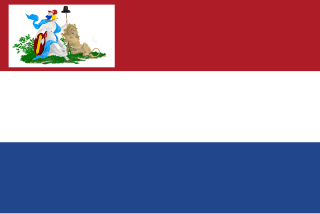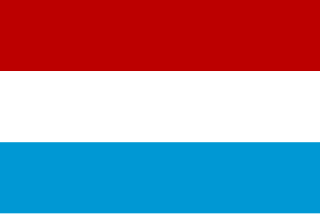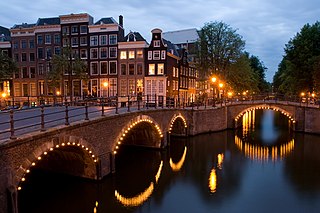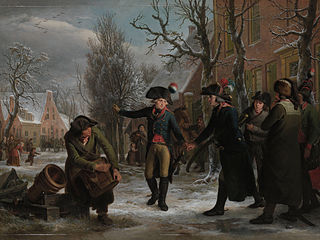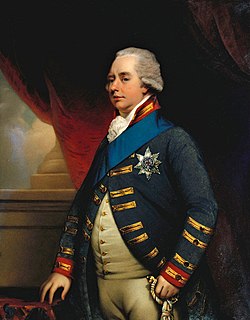
William I was a Prince of Orange and the first King of the Netherlands and Grand Duke of Luxembourg.

In the Low Countries, stadtholder was an office of steward, designated a medieval official and then a national leader. The stadtholder was the replacement of the duke or earl of a province during the Burgundian and Habsburg period.

The Patriottentijd was a period of political instability in the Dutch Republic between approximately 1780 and 1787. It takes its name from the radical political faction known as the Patriotten who opposed the rule of the stadtholder, William V, Prince of Orange, and his supporters who were known as Orangists.

Isaac Jan Alexander Gogel was the first minister of finance of the Batavian Republic and the Kingdom of Holland. He married Catharina van Hasselt in 1800, and had three children.

The Uitvoerend Bewind was the name of the government of the Batavian Republic between 1798 and 1801. The president of the Uitvoerend Bewind was head of state of the Batavian Republic.
The States General of the Batavian Republic was the name for the Dutch government between January, 1795 and March 1796. It was nominally the same as the States-General of the Dutch Republic, the predecessor of the Batavian Republic, as the old constitution, the Union of Utrecht remained in place till a new National Assembly of the Batavian Republic was seated after a general election, under universal manhood suffrage. As under the old constitution the States of the seven provinces remained the basis for representation in the States-General. However, those States were in most cases replaced by new representative bodies, like the Provisional Representatives of the People of Holland.The places of the members of the previous Orangist regime as representatives of the Seven Provinces were now taken by members of the Patriot party. The presidents of the States-General, both under the old and the new Republic, were acting as head of state for their term in office as president.

Gijsbert Karel, Count van Hogendorp was a liberal conservative and liberal Dutch statesman. He was the brother of Dirk van Hogendorp the elder and the father of Dirk van Hogendorp the younger.

Rutger Jan Schimmelpenninck, Lord of Nyenhuis, Peckedam and Gellicum, was a Dutch jurist, ambassador and politician who served as Grand Pensionary of the Batavian Republic from 1805 to 1806.

Pieter Vreede, was a Dutch politician of the Batavian Republic in the 18th century. Vreede was born in Leiden and died in Heusden. He was a prominent critic of stadholderian misrule and of the urban patriciate.

In the 16th, 17th and 18th centuries, the regenten were the rulers of the Dutch Republic, the leaders of the Dutch cities or the heads of organisations. Though not formally a hereditary "class", they were de facto "patricians", comparable to that ancient Roman class. Since the late Middle Ages Dutch cities had been run by the richer merchant families, who gradually formed a closed group. At first the lower-class citizens in the guilds and schutterijen could unite to form a certain counterbalance to the regenten, but in the course of the 15th century the administration of the cities and towns became oligarchical in character. From the latter part of the 17th century the regent families were able to reserve government offices to themselves via quasi-formal contractual arrangements. In practice they could only be dislodged by political upheavals, like the Orangist revolution of 1747 and the Patriot revolt of 1785.

The States of Friesland were the sovereign body that governed the province of Friesland under the Dutch Republic. They were formed in 1580 after the former Lordship of Frisia acceded to the Union of Utrecht and became one of the Seven United Netherlands. The Frisian stadtholder was their "First Servant". The board of Gedeputeerde Staten was the executive of the province when the States were not in session. The States of Friesland were abolished after the Batavian Revolution of 1795, when the Batavian Republic was founded. They were resurrected in name in the form of the Provincial States of Friesland under the Constitution of the Kingdom of the Netherlands.
Pierre Auguste Brahain Ducange was a French journalist, minor diplomat, secret agent, swindler, and author. He was the father of the French author Victor Henri Joseph Brahain Ducange. He played an important role in the coup d'état of 22 January 1798 in the Batavian Republic, by general Herman Willem Daendels, which brought the radical unitarist faction of Wybo Fijnje and Pieter Vreede to power, and he helped write the Staatsregeling voor het Bataafse Volk of 1798.
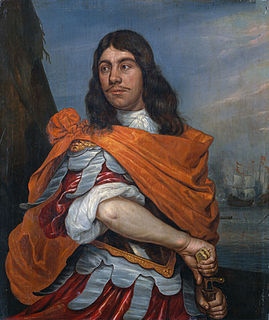
In the history of the Dutch Republic, Orangism or prinsgezindheid was a political force opposing the Staatsgezinde (pro-Republic) party. Orangists supported the princes of Oranges as Stadtholders and military commanders of the Republic, as a check on the power of the regenten. The Orangist party drew its adherents largely from the common people, soldiers, the nobility and orthodox preachers, though its support fluctuated heavily over the course of the Republic's history.
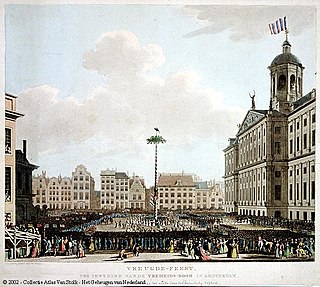
The Batavian Revolution in Amsterdam refers to the transfer of power in the city of Amsterdam on 18 January 1795 to a Revolutionary Committee of the new Batavian Republic. The same day the stadtholder of the Dutch Republic, William V, Prince of Orange fled the country. Amsterdam was the first city that declared itself in the Batavian Revolution that brought about the Batavian Republic.
A constitutional referendum was held in the Batavian Republic in 1798. After a previous referendum in 1797 resulted in a coup d'état, a new constitution was written. On 23 April 1798, a referendum was held about the new constitution. Only opponents of the federalists were allowed to vote.

The Act of Guarantee of the hereditary stadtholderate was a document from 1788, in which the seven provinces of the States General and the representative of Drenthe declared, amongst other things, that the admiralty and captain-generalship were hereditary, and together with the hereditary stadtholderate would henceforth be an integrated part of the constitution of the Dutch Republic. Moreover, members of the House of Orange-Nassau would have the exclusive privilege to hold the office. The Act was in force until the Batavian Republic was established in 1795.

Carel de Vos van Steenwijk was a Dutch politician and diplomat.
